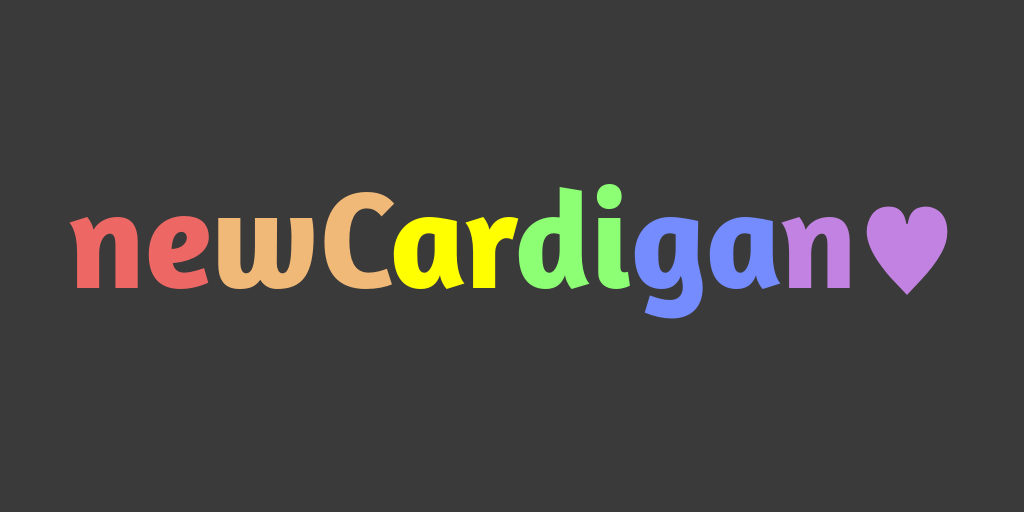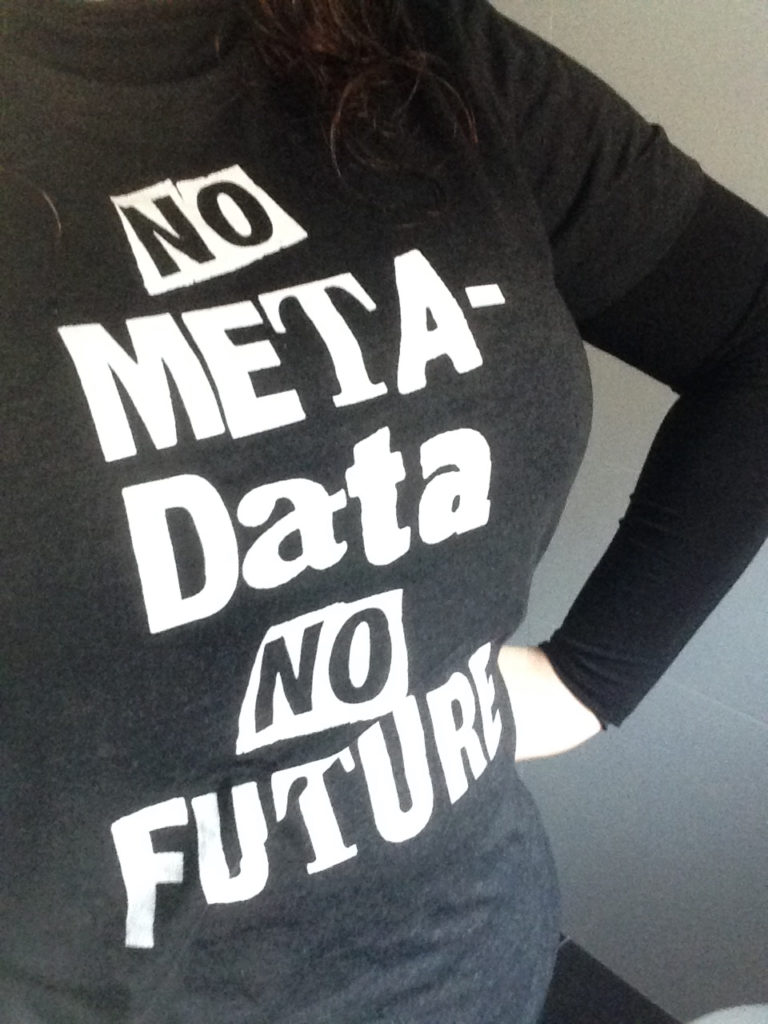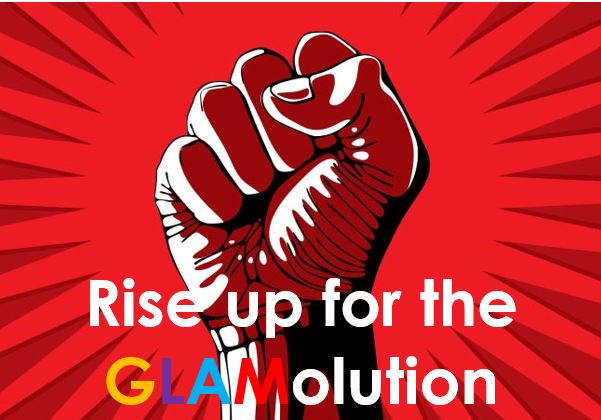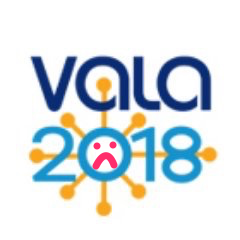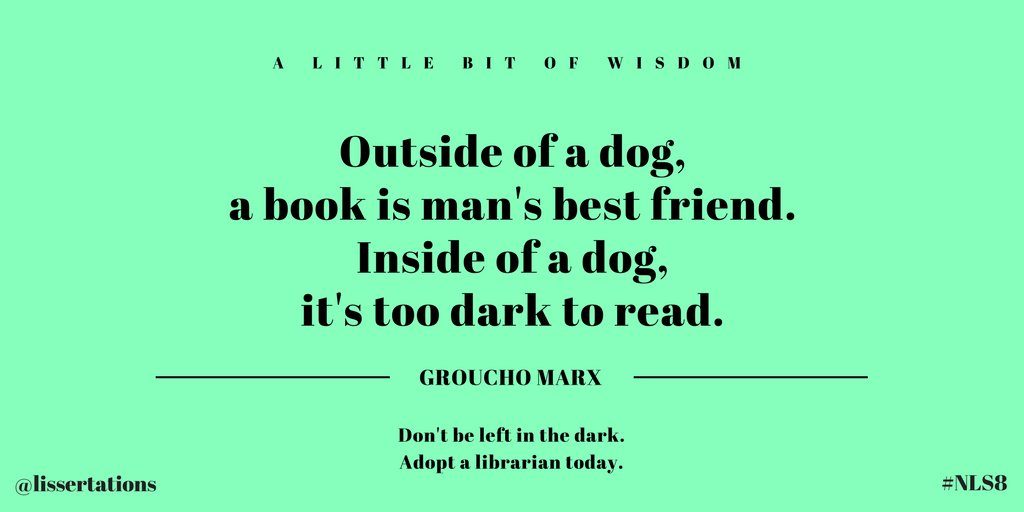I’ve done a lot of talking over the last couple of weeks. So much, in fact, that I have been richly rewarded with a persistent hacking cough and the subsequent loss of half my vocal range. (It’s put a serious dent in my karaoke plans.) A lot has gone into helping me find my voice, learning when and how to deploy it, knowing when to stop talking, and realising my limits. A lot went into losing my voice, too.
Joining the fishpond
As you may already have heard, I was the featured guest on episode 18 of the Turbitt & Duck podcast, hosted by dynamic library duo Sally Turbitt and Amy Walduck. You may remember Sally and Amy as the NLS8 co-convenors, who have decided to use their powers for good and amplify a range of GLAM voices via their fortnightly podcast. Sally asked me at #coGLAM18 if I was interested in being on the show, and I said yes on the condition that I didn’t have to provide a photo of my face…
I love how so far nobody has batted an eyelid about the fact I look like a fried egg with a face drawn on in tomato sauce. ?? https://t.co/TxgrPvtRx8
— Alissa M. (@lissertations) 3 July 2018
Inexplicably, the episode has been getting rave reviews! I’m thrilled that people seem to have genuinely enjoyed spending an hour and 15 minutes listening to me talk about cataloguing—it’s a subject not usually renowed for attracting people’s attention. I also enjoyed making ‘Bibliographic Data Wizard’ a thing. I think I need it on a t-shirt. Or my email signature.
Despite my cheerful and engaged exterior, I was extremely anxious during recording. Making this podcast was one of the most stressful things I have ever done. This is through absolutely no fault of Sally and Amy’s, who went out of their way to help me feel comfortable and reassured, and who could tell I was a long way out of my comfort zone. The episode you’re listening to is actually the second take—it got so bad I asked to pause the recording after a good half-hour of talking, and we agreed to start over. Getting through recording took a long time and was incredibly draining. (I don’t know how Sally and Amy do this every fortnight—they have souls of steel!) I’m not sure how I sound on the podcast, not being a reliable judge of my own voice, but if I sound stressed or nervous or jittery, it’s because I am. Outreach doesn’t come naturally to me, but here I am doing it anyway. I’m glad I did the podcast, and I’m hugely grateful to Sally and Amy for the opportunity (and for your support!), but I’m not sure I could record another one for a long while.
I also want to reiterate the advice I gave to students and new graduates about using your voices for good. Never be afraid to speak up. Speak up and out and loudly, because you are the future. Talk about what doesn’t make sense. Talk about things in libraries you think are weird, or old, or strange, or stupid, because without your input, more experienced practitioners often won’t realise there is a problem at all. For better or worse, they rely on people speaking up. If speaking out loud is as hard for you as it is for me, hop on twitter, set up a blog, join some library facebook groups. Don’t keep your opinions to yourself—let them out, nurture them, help them grow.
Talking out loud
A couple of months ago I was, erm, volunteered into giving a talk at my (now former) workplace about using web archives for reference queries, based on a blog post I wrote on the subject. I must admit I wasn’t wild about the idea but resolved to do it anyway, largely because invites had already been sent out, and also because I figured I wouldn’t get better at stuff I don’t practise.
True to form, I asked the internet for help. I was blown away by the quantity and quality of advice I received on effective public speaking and the calming of nerves—your suggestions made a big difference, and I am truly grateful. 🙂 Open up the thread below and have a read. I thoroughly recommend it.
Twitter, how do you give talks and speeches without having a panic attack? I need your wisdom and guidance. Tell me your secrets!!
— Alissa M. (@lissertations) 24 May 2018
It didn’t stop me being super nervous on the day of the presentation, though. My colleague was gracious enough to admit that if she’d realised how anxious I would be about presenting, she might have reconsidered volunteering me for it, but she did take care of the IT and the room booking and getting people to show up (she’s quite good at that). I’m sure I spoke too fast and looked very nervous, but the attendees seemed to enjoy the talk, and a couple of people asked for the slides afterwards. I even managed a small web archive hiccup with a well-timed ‘here’s one I prepared earlier’ screenshot. #smooth
Overall, while I’m glad the presentation went well, the idea of public speaking wasn’t something I was keen to repeat. So what did I do? Submitted an abstract for a big fancy conference. I was encouraged to do this by well-meaning people on twitter, even as I felt I wasn’t quite ready, that the conference wasn’t a good fit for me, that my proposal was shallow and ill-considered. I went ahead and submitted.
I withdrew from this conference last week. I had come to realise that between the web archives talk and the podcast recording, public speaking or presenting of any kind was, for the moment, beyond my capabilities. And the podcast wasn’t even that public. I recorded Turbitt & Duck in my dressing gown, in my house, with a pot of tea and two very supportive ladies for company. On paper it couldn’t have been more comfy. But other people can only do so much to help me overcome my nerves. At root it’s a me problem. It’s my own personal inability to cope with suddenly having an audience listening to my every word, probably livetweeting it, being on the spot and needing to instantly have an answer. I can’t do it. It is beyond me. So, for the moment, I’m quitting while I’m ahead.
Having said all that: my next big professional goal is to present at NLS9, on a topic close to my heart. It’ll be a friendly and supportive audience. I’ve already got half the talk written. I am super motivated to make this happen, and it’s far enough away that I’m hopeful of conquering my fear of professional public speaking beforehand. If I don’t succeed… well, there’s always twitter. Or tranquilliser.
